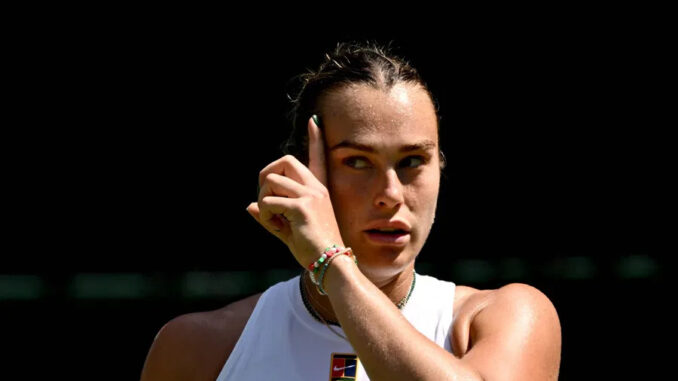
Aryna Sabalenka, the indomitable World No. 1 and three-time Grand Slam champion, has solidified her place as the WTA Tour’s dominant force in 2025, but her ascent has come with a quieter, personal cost. Known for her ferocious groundstrokes and infectious energy, the Belarusian star has faced setbacks in her friendships, as revealed by her former close friend and fellow player Veronika Kudermetova. In a candid reflection, Kudermetova shared that Sabalenka, now surrounded by a large team and laser-focused on her tennis ambitions, “barely talks to anyone,” highlighting the isolating toll of her relentless pursuit of greatness.
Sabalenka’s 2025 season has been a masterclass in resilience and dominance. Despite falling short in three major finals—at the Australian Open to Madison Keys, the French Open to Coco Gauff, and Wimbledon to Amanda Anisimova—she has claimed three WTA titles in Madrid, Miami, and Brisbane, maintaining a commanding 3,741-point lead in the rankings. Her 51-match win tally this year, coupled with a 73% win rate on hard courts, underscores her status as the tour’s leading figure. Yet, Kudermetova’s remarks paint a different picture off the court. “No, we communicate less now,” the Russian said, reflecting on their faded connection. “She’s the number one tennis player in the world, has a large team, doesn’t get distracted, and barely talks to anyone,” she added, noting Sabalenka’s intense focus on her goals.
The Belarusian’s journey to the top has been marked by both triumph and tragedy. After the sudden death of her ex-boyfriend Konstantin Koltsov in 2024, Sabalenka admitted she struggled to balance her personal grief with her professional drive. “Looking back, I definitely think that I should have just stopped and separated myself from tennis, just have a little break, recharge and start things over again,” she reflected, acknowledging the mental toll of pushing through. Her decision to keep playing, even practicing publicly the day after Koltsov’s passing, showcased her determination but may have deepened her isolation. Her father’s death in 2019, another profound loss, further shaped her approach, as she channeled grief into her game, a trait that has both fueled her success and distanced her from others.
On the court, Sabalenka’s intensity is unmistakable. Her powerful serve, averaging 115 mph, and aggressive baseline play have overwhelmed opponents, as seen in her 6-1, 6-0 thrashing of Kamilla Rakhimova at the French Open. Yet, her emotional outbursts, like the 70 unforced errors in her French Open final loss to Gauff, reveal a player grappling with pressure. “It felt like a joke,” she said of the match, frustrated by windy conditions and her own mistakes. “I didn’t play my best, and Coco stepped up and played with poise and purpose,” she later conceded, showing growth in handling defeat after apologizing for earlier “unprofessional” comments about Gauff’s win.
Kudermetova’s observations highlight the sacrifices behind Sabalenka’s rise. Once known for her fun-loving off-court persona—often seen joking with fans or indulging her sweet tooth with her grandmother’s pancakes—Sabalenka has become more guarded. Her coaching team, led by Anton Dubrov and fitness trainer Jason Stacy, keeps her disciplined, while her new relationship with Brazilian entrepreneur Georgios Frangulis offers personal support. “I’m so lucky to have you by my side,” she wrote on Instagram, celebrating Frangulis’ birthday, a rare glimpse into her private life. Their romance, sparked through a sponsorship with Frangulis’ Oakberry brand, has been a bright spot, with Sabalenka launching her own Power Serve bowl, which she calls “a cool, healthy snack that gives lots of energy.”
Despite her focus, Sabalenka’s lighter side occasionally emerges. After her Wimbledon loss, she stuck out her tongue at reporters, joking, “Ha, ha, ha, you didn’t get anything!”—a stark contrast to her emotional French Open press conference. “I just don’t want to face that hate again,” she said, determined to stay composed. Her rivalry with Iga Swiatek, where she trails 8-5 but won a thrilling 2025 French Open semifinal, and her 7-4 edge over Elena Rybakina, showcase her competitive fire. Yet, Kudermetova’s words suggest these battles have come at the expense of personal connections.
As Sabalenka eyes a fourth Grand Slam at the US Open, where she triumphed in 2024, her journey reflects the delicate balance between ambition and human connection. “I realized there’s more to life than tennis,” she told SELF magazine, hinting at a desire to reconnect with her roots. With her tiger tattoo and fierce nickname, “The Tiger,” Sabalenka remains a force on the court, but her ex-friend’s revelation serves as a poignant reminder that even the world’s best can feel alone at the top.
Leave a Reply